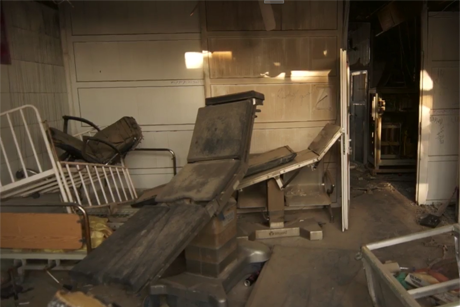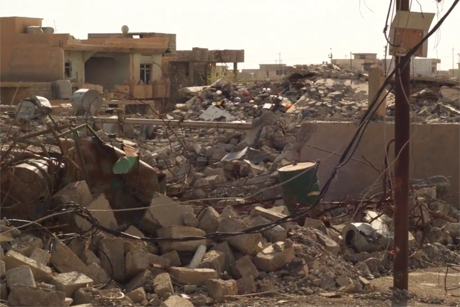
Photo Credit: Chris Shearer / The Melbourne Anglican
[The Melbourne Anglican, by Chris Shearer] Qolu sits on a long padded mat inside a tent on Mount Sinjar, northern Iraq. A tuft of white hair pokes out from beneath his headscarf and his grey moustache covers almost his entire mouth. Twenty-five members of his family, from toddlers to the elderly, have called a few tents on the mountain home since Daesh attacked the city of Sinjar in August 2014. This large family was lucky, able to escape by making a difficult journey up the mountain on foot. Qulo recounts the hardships of their escape without relish.
“Hunger, thirst, harsh conditions and walking all the way here. No means of transport were available to save ourselves by. All our belongings were left behind and got torched,” he explains.
In that mass exodus towards the mountaintop many of Sinjar’s residents suffered. The winding road to the summit is littered with rusted cars, some abandoned, some destroyed, and piles of clothing and other personal items are strewn among the rocks. Some 50,000 were trapped on the summit, starving, dying of thirst. Yesra, a young woman who also lives on the mountain, says she witnessed many children die in those first few days.

A bomb-damaged medical facility in northern Iraq.
Photo: Chris Shearer / The Melbourne Anglican
“I don’t know how many, but a lot,” she says.
Scenes of this unfolding humanitarian crisis galvanised the world into action. Food, water and shelter were airlifted onto Mount Sinjar. Local Yazidi and Syrian-based Kurdish militia were able to repel Daesh from the summit and eventually open relief lines. Those on the mountain are more fortunate than those who could not escape. In the 15 months of occupation that followed Yazidi women were sold into slavery and men forcibly converted to Islam or executed. In a field only a few hundred metres behind the front line hides a terrible reminder of this brutality; a mass grave about 20 metres long, strewn with human bones, tattered clothing and bullet casings.
“This one probably holds 200 people,” says David Shumock, an American volunteer with the Kurdish militia, the Peshmerga. “There was nothing stopping [Daesh], except the occasional airstrike.”
This particular targeting of religious minorities led Archbishop Philip Freier and the visiting Archbishop of Canterbury Justin Welby to launch Anglican Overseas Aid’s Northern Iraq crisis appeal in August 2014. In the year that followed Australians raised more than $203,000 [AUD, approximately £105,000 GBP] for the appeal, providing much needed support for displaced people.
Using these donations from Australia and elsewhere in the world, Anglican Overseas Aid’s ACT Alliance partners, Christian Aid and the Lutheran World Federation, were able to distribute aid to thousands who had escaped to the relative safety of Kurdish-controlled areas, including food, hygiene kits, bedding, cooking sets, clothing, shelter, fresh-water wells, assistance to the disabled and professional psychological counselling and support. Yet as the tides of battle change, more people than ever must rely on outside help.
What is left of Sinjar was retaken by Kurdish Peshmerga forces in November 2015. Heavy fighting and aerial bombardment has left much of the town in ruins, leaving some 15,000 former residents still stranded on the mountain and many thousands more displaced across Iraq and Syria months after the city was liberated.

A conflict-ravaged town in northern Iraq.
Photo: Chris Shearer / The Melbourne Anglican
“I haven’t found a house that’s intact yet,” says American aid volunteer Chad Martin. Chad and a small group of Americans are with Plain Compassion Crisis Response, a Christian aid organisation that is the only NGO currently operating in Sinjar. It is working to rebuild houses and other essential buildings so people can return to their homes. Chad estimates that around 10 to 15 per cent of structures are completely destroyed, with the remainder damaged by bombs, gunfire or fire. Yet the damage isn’t the only thing keeping Sinjar’s former residents away. The frontline with Daesh is only three kilometres from the city at some points, and attacks still sporadically occur. This kind of danger, coupled with the bureaucratic issues of gaining access to what is essentially just behind the frontline, may explain why so little foreign aid has made it this far.
And so the thousands of people here continue to suffer the injustices of war. With the district still dangerous it may be some time before they see any foreign aid, and hundreds of thousands of people still need ongoing support in other parts of northern Iraq. As more areas are reclaimed from Daesh control that number only grows. Rumours abound about an inevitable assault to recapture Mosul, a city of two million. While the timing of this offensive remains the subject of speculation, one thing is clear — many more people in this war-ravaged country will soon need help just surviving.
- Click here to watch a video report by the Melbourne Anglican’s Chris Shearer
- Click here to support Anglican Overseas Aid Australia’s Northern Iraq Appeal